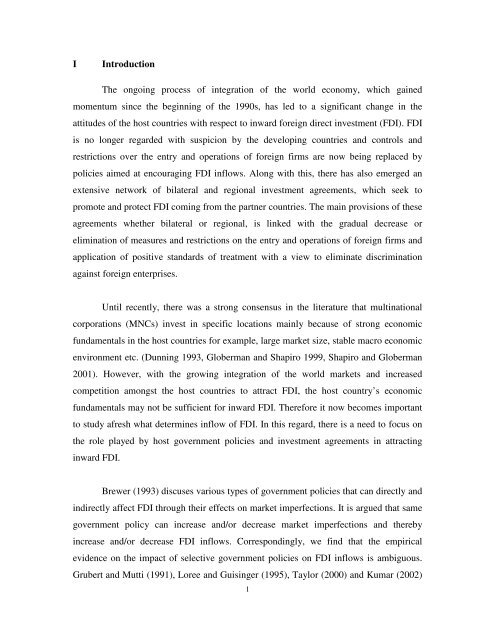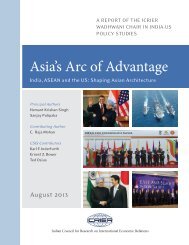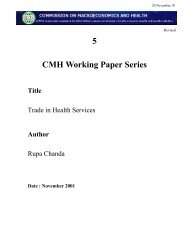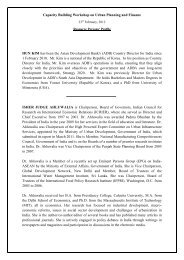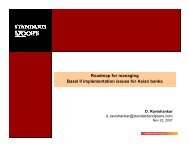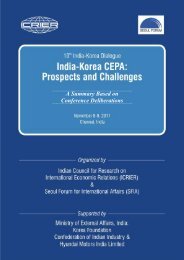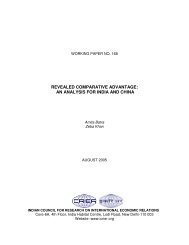impact of government policies and investment agreements on fdi ...
impact of government policies and investment agreements on fdi ...
impact of government policies and investment agreements on fdi ...
Create successful ePaper yourself
Turn your PDF publications into a flip-book with our unique Google optimized e-Paper software.
I<br />
Introducti<strong>on</strong><br />
The <strong>on</strong>going process <str<strong>on</strong>g>of</str<strong>on</strong>g> integrati<strong>on</strong> <str<strong>on</strong>g>of</str<strong>on</strong>g> the world ec<strong>on</strong>omy, which gained<br />
momentum since the beginning <str<strong>on</strong>g>of</str<strong>on</strong>g> the 1990s, has led to a significant change in the<br />
attitudes <str<strong>on</strong>g>of</str<strong>on</strong>g> the host countries with respect to inward foreign direct <str<strong>on</strong>g>investment</str<strong>on</strong>g> (FDI). FDI<br />
is no l<strong>on</strong>ger regarded with suspici<strong>on</strong> by the developing countries <str<strong>on</strong>g>and</str<strong>on</strong>g> c<strong>on</strong>trols <str<strong>on</strong>g>and</str<strong>on</strong>g><br />
restricti<strong>on</strong>s over the entry <str<strong>on</strong>g>and</str<strong>on</strong>g> operati<strong>on</strong>s <str<strong>on</strong>g>of</str<strong>on</strong>g> foreign firms are now being replaced by<br />
<str<strong>on</strong>g>policies</str<strong>on</strong>g> aimed at encouraging FDI inflows. Al<strong>on</strong>g with this, there has also emerged an<br />
extensive network <str<strong>on</strong>g>of</str<strong>on</strong>g> bilateral <str<strong>on</strong>g>and</str<strong>on</strong>g> regi<strong>on</strong>al <str<strong>on</strong>g>investment</str<strong>on</strong>g> <str<strong>on</strong>g>agreements</str<strong>on</strong>g>, which seek to<br />
promote <str<strong>on</strong>g>and</str<strong>on</strong>g> protect FDI coming from the partner countries. The main provisi<strong>on</strong>s <str<strong>on</strong>g>of</str<strong>on</strong>g> these<br />
<str<strong>on</strong>g>agreements</str<strong>on</strong>g> whether bilateral or regi<strong>on</strong>al, is linked with the gradual decrease or<br />
eliminati<strong>on</strong> <str<strong>on</strong>g>of</str<strong>on</strong>g> measures <str<strong>on</strong>g>and</str<strong>on</strong>g> restricti<strong>on</strong>s <strong>on</strong> the entry <str<strong>on</strong>g>and</str<strong>on</strong>g> operati<strong>on</strong>s <str<strong>on</strong>g>of</str<strong>on</strong>g> foreign firms <str<strong>on</strong>g>and</str<strong>on</strong>g><br />
applicati<strong>on</strong> <str<strong>on</strong>g>of</str<strong>on</strong>g> positive st<str<strong>on</strong>g>and</str<strong>on</strong>g>ards <str<strong>on</strong>g>of</str<strong>on</strong>g> treatment with a view to eliminate discriminati<strong>on</strong><br />
against foreign enterprises.<br />
Until recently, there was a str<strong>on</strong>g c<strong>on</strong>sensus in the literature that multinati<strong>on</strong>al<br />
corporati<strong>on</strong>s (MNCs) invest in specific locati<strong>on</strong>s mainly because <str<strong>on</strong>g>of</str<strong>on</strong>g> str<strong>on</strong>g ec<strong>on</strong>omic<br />
fundamentals in the host countries for example, large market size, stable macro ec<strong>on</strong>omic<br />
envir<strong>on</strong>ment etc. (Dunning 1993, Globerman <str<strong>on</strong>g>and</str<strong>on</strong>g> Shapiro 1999, Shapiro <str<strong>on</strong>g>and</str<strong>on</strong>g> Globerman<br />
2001). However, with the growing integrati<strong>on</strong> <str<strong>on</strong>g>of</str<strong>on</strong>g> the world markets <str<strong>on</strong>g>and</str<strong>on</strong>g> increased<br />
competiti<strong>on</strong> am<strong>on</strong>gst the host countries to attract FDI, the host country’s ec<strong>on</strong>omic<br />
fundamentals may not be sufficient for inward FDI. Therefore it now becomes important<br />
to study afresh what determines inflow <str<strong>on</strong>g>of</str<strong>on</strong>g> FDI. In this regard, there is a need to focus <strong>on</strong><br />
the role played by host <str<strong>on</strong>g>government</str<strong>on</strong>g> <str<strong>on</strong>g>policies</str<strong>on</strong>g> <str<strong>on</strong>g>and</str<strong>on</strong>g> <str<strong>on</strong>g>investment</str<strong>on</strong>g> <str<strong>on</strong>g>agreements</str<strong>on</strong>g> in attracting<br />
inward FDI.<br />
Brewer (1993) discuses various types <str<strong>on</strong>g>of</str<strong>on</strong>g> <str<strong>on</strong>g>government</str<strong>on</strong>g> <str<strong>on</strong>g>policies</str<strong>on</strong>g> that can directly <str<strong>on</strong>g>and</str<strong>on</strong>g><br />
indirectly affect FDI through their effects <strong>on</strong> market imperfecti<strong>on</strong>s. It is argued that same<br />
<str<strong>on</strong>g>government</str<strong>on</strong>g> policy can increase <str<strong>on</strong>g>and</str<strong>on</strong>g>/or decrease market imperfecti<strong>on</strong>s <str<strong>on</strong>g>and</str<strong>on</strong>g> thereby<br />
increase <str<strong>on</strong>g>and</str<strong>on</strong>g>/or decrease FDI inflows. Corresp<strong>on</strong>dingly, we find that the empirical<br />
evidence <strong>on</strong> the <str<strong>on</strong>g>impact</str<strong>on</strong>g> <str<strong>on</strong>g>of</str<strong>on</strong>g> selective <str<strong>on</strong>g>government</str<strong>on</strong>g> <str<strong>on</strong>g>policies</str<strong>on</strong>g> <strong>on</strong> FDI inflows is ambiguous.<br />
Grubert <str<strong>on</strong>g>and</str<strong>on</strong>g> Mutti (1991), Loree <str<strong>on</strong>g>and</str<strong>on</strong>g> Guisinger (1995), Taylor (2000) <str<strong>on</strong>g>and</str<strong>on</strong>g> Kumar (2002)<br />
1


